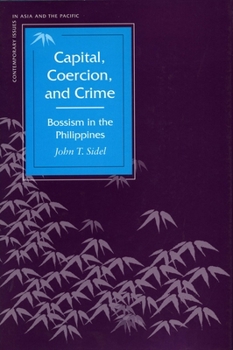Capital, Coercion, and Crime: Bossism in the Philippines
Select Format
Select Condition 
Book Overview
This book focuses on local bossism, a common political phenomenon where local power brokers achieve monopolistic control over an area's coercive and economic resources. Examples of bossism include Old Corruption in eighteenth-century England, urban political machines in the United States, caciques in Latin America, the Mafia in Southern Italy, and today's gangster politicians in such countries as India, Russia, and Thailand. For many...
Format:Paperback
Language:English
ISBN:0804737460
ISBN13:9780804737463
Release Date:December 1999
Publisher:Stanford University Press
Length:248 Pages
Weight:1.85 lbs.
Dimensions:0.7" x 6.0" x 9.1"
Customer Reviews
1 rating
Understanding the Filipino Mind
Published by Thriftbooks.com User , 22 years ago
John Sidel has written a great deal on the Filipino family and its impact upon Philippine politics. In this book he weaves together much of his own research, along with that collected by others interested in the unique role of the family in the Philippines, in an effort to develop a cohesive theory with which to understand the archipelago. The narratives within the book, detailing local power structures in Cavite and Cebu, are excellent and Sidel has obviously researched his subjects exhaustively. For those from the Southern Philippines the stories of the Osmena family will be, perhaps, only too familiar and readers will likely be left comparing his examples to those they encountered in their province or barangay. But the book fails at offering anything close to a significant critique of Joel Migdal's "strong society, weak state" theory of (under)development. Sidel's tale of local bosses that manipulate and control governmental structures to personally enrich themselves is helpful, but as Kerkvliet has suggested about clientelistism approaches, too narrow. Though some powerful patriarchs have been able to use public resources to garner and control wealth, families of "old" (friar estates) wealth still exist and have not been displaced. Nevertheless, the book is an enjoyable read for those interested in Filipino politics and is additionally helpful in that it removes the traditional emphasis on Manila and villages near central Luzon as the locus for research on the country. I greatly enjoy Sidel's writing style and hope that he builds on the work that he has done in compiling an intelligent history of the ever changing role of the Chinese in the Philippines.





